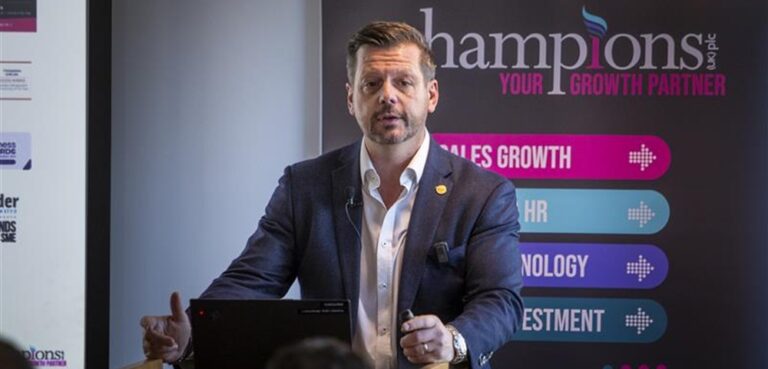SETTING the right price is one of the biggest challenges SMEs face, often leading to undervaluation that stifles growth and profitability.
Striking the balance between competitiveness and value is essential, but many businesses still struggle to recognise their true worth.
Matthew Hayes, Managing Director of growth partner Champions (UK) plc, shares his insights on how SMEs can rethink their pricing strategies.
Unilateral pricing
“It’s obviously a standard, industry-wide fact that large, established corporations charge significantly more,” he outlined. “This is often for worse products or services than those of a smaller startup.
“One of the things that an SME can naturally do in order to get a foothold and be a challenger in an established market is by pricing unilaterally. The easiest and simplest way to grab some market share is to be price-led, although I think that that’s a very limiting view.
“Things that I think all SMEs should consider is: ‘Is the price saving going to be enough?’ As challengers, they’re having to change behaviours. Unless you’re going into a brand new market, of which very rarely is that the case, you’re having to get your clients or customers to buy from them versus what they are currently buying.
“So price is invariably not going to be big enough. If they want to address pricing, they’ve got to also address brand, because brand is the equivalent of trust. They’ve got to also put front and centre other key parts of decision making, customer service, relationship and responsiveness. You get those things right, and price becomes secondary.”
Building trust in your market
“If it’s not new and it’s established, then is price significant enough? The reality is, price is only part of the decision-making process. A bigger part to that is actually trust. The reason that big, international organisations charge more is because people will pay more often for a knowingly substandard service, because they get it’s consistent.
“If you are competing on price and you’re a commodity, for example a biro, the price of a Mont Blanc pen isn’t relevant, and it becomes aspirational. No one aspires to the cheapest. You want to be driving service, value, return, trust, build loyalty, build relationships.
“Very few take the due diligence to actually run competitive analysis. Do they know what other prices are being charged in the market? Where have they got their pricing from?
“Once you establish yourself and you have a loyal client base, don’t be afraid to improve, increase price over time, because you have a relationship. You have loyalty, you have proved yourself.”
Understanding true cost
“Again, a major error that happens in SMEs is that they don’t understand the concept of true cost.
“‘It costs me 100 pounds to make it. If I sell it for 110 I’ve made 10% margin’ – I very much doubt you have. Because how much does it cost you to store it? What’s the labour costing involved in not just manufacturing it, but actually the head office labour costs? Have you apportioned all of those costs against cost of production? Is there any wastage?
“People tend to cost things based around direct material pricing, as opposed to the actual cost of the business as a whole, apportioned to the amount of products it sells. The minute you start to understand true cost versus material cost, or build cost, then price has to change.
“Very often we’ll see SME businesses start to get a foothold, but actually never really becoming profitable, and therefore never really getting out from underneath the challenges of being that small business.”
Driving perception
“A lot of SMEs will go to the lower end of the price scale because they’ve got a concern around being a direct competitor to bigger, established businesses. But what they don’t realise is they’re going to be a direct competitor to them anyway, because they have the choice to buy that versus them.
“Actually, human psychology isn’t as simple as ‘cheap is good’. In fact, often it’s detrimental, because it is seen as low value, and people don’t want cheap. So there is that premise of price driving perception. So the more you charge, the better it must be.
“Going a step further on from that, ‘Veblen brands’ are things like luxury items. The more it costs, more people are inspired by it: Louis Vuitton, Hermes, Rolls Royce. There is an entire market sector that charge significantly above an accepted material price for brand, and clients fill the gap with a belief of luxury or perception of status or value.
“Price, in a lot of instances, actually can be a hindrance to sales, because there is a concern around quality because it’s too cheap, or a lack of understanding by being hyper expensive.”
Knowing your marketplace
“In conclusion, know your marketplace, know where you sit and fit, and know all the other pricing options. Understand that if you’re in an established market, you are having to change behaviours, so work on the things that are going to be the reasons that they change.
“It’s unlikely that price is going to be the only reason. Consider and work on messaging all of the factors around change. It’s good to get a full use price as a foothold, but you are going to have to move price over time again and again.
“Don’t become a price-led commodity, because then the minute somebody else comes cheaper, that client base will move. A price-led client base is highly disloyal, and therefore that’s why we work so hard around branding and messaging, because that should be the point of difference, not price.”


